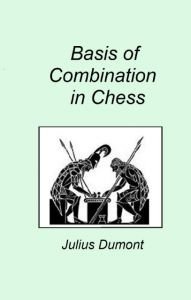The Basis of Combination in Chess - download book

To the chessplayer there is something glamorous, almost mystic, in the very word "combination"; it conveys to him a different world, a world peopled by Morphy, Anderssen, Alekhine, and all the great figures in chess; it reminds him of their grand and stirring deeds.
The great fascination is the idea of the sacrifice of material for something less tangible, but more valuable; it typifies the triumph of mind over matter.
That is the idealized and justified view.
And yet, the object of a combination, though often many-sided, is perfectly clear-cut, and its means of attainment are capable of being analysed.
A combination, the object of which is meretricious brilliance, is aesthetically wrong, and the only sacrifice that is justified is one without which victory cannot be achieved, or at least not with the same swiftness and decision.
The combination has a most important function in chess; in fact, without it, chess would die of inanition.
The technique of the game has improved to such an extent amongst practically all players who take it seriously, that an inordinate proportion of games would normally end in draws. This is where the combination comes into its own. At the right moment and, if necessary, at the cost of material, it gains the necessary time to drive home an advantage or brings to bear, for a short but sufficient space of time, an overpowering concentration of forces on a vital spot.
Conversely, the same means may be employed to avert an almost certain loss.
The difficulty for the average player is to recognize the exact moment when a combination becomes necessary as well as possible (both for attacking and defensive purposes), and to decide also which type of combination will meet the case.
As in all combinations the power and peculiarities of the particular piece which is to inflict the final sanctions, are the deciding factors, we shall now proceed to examine each unit in turn, and to study its strength and weaknesses. Afterwards, turning our attention to various groupings of units, we shall see how their characteristics blend together, and what results may be expected from their coordination.
Authors: Julius Dumont
Title: "The Basis of Combination in Chess"
Released: 1978
Format: rar/pdf
Quality: good
Number of pages: 224
Size: 18 Mb
Comment 0